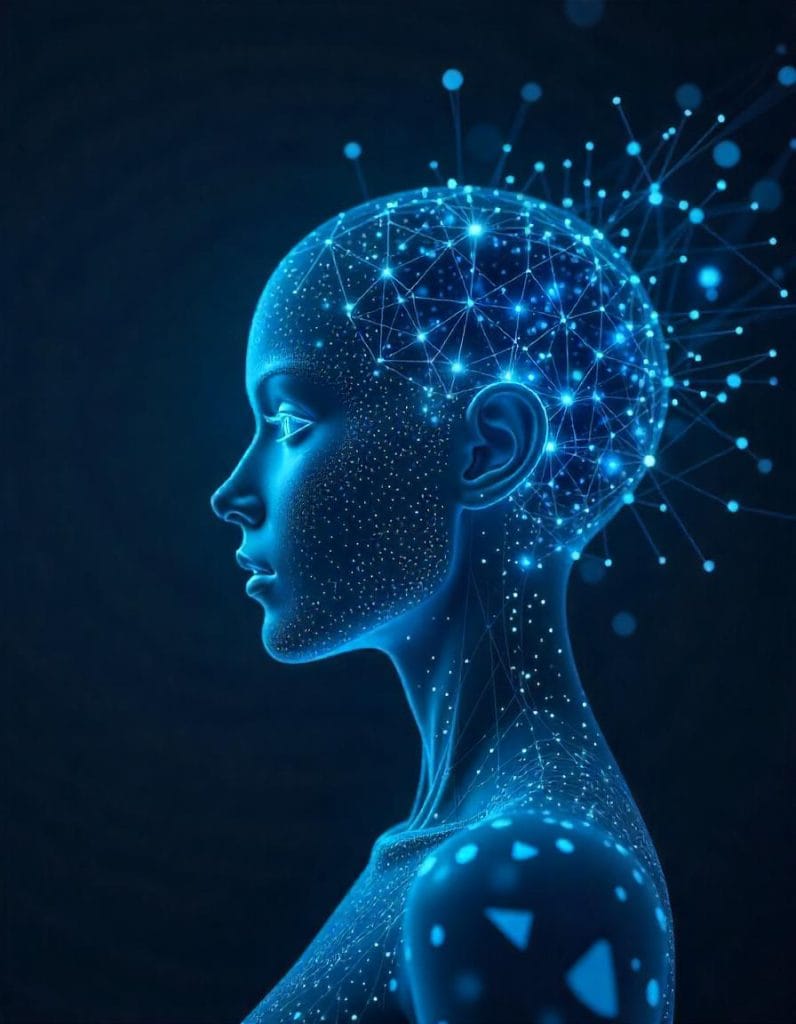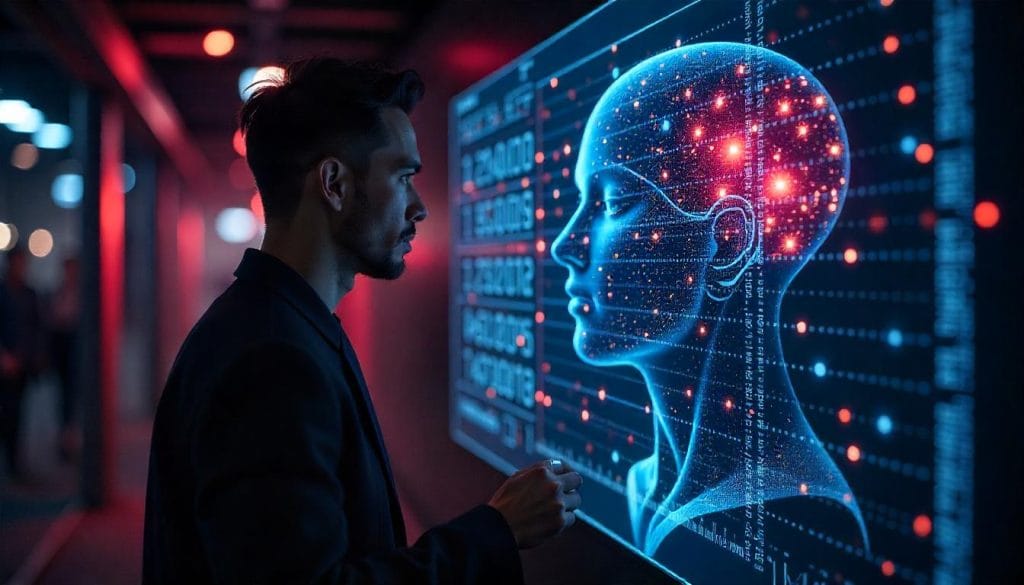AI Technology Trends 2025 are expected to transform the businesses, restructure the production processes, and impact the daily life in ways we have never seen. Besides the fact that AI is getting more and more intelligence, it is also getting wiser, faster, and programmed to fit in place in various fields. Machines are now our help in automating daily tasks, progress in healthcare, and cybersecurity was done through AI, a topic that is now seen not as an idea of the future but as one of the present days. The main AI developments expected for 2025 and their influence on the future will be dealt with in these sections.
AI Technology Trends 2025: The Rise of Generative AI and Advanced Language Models
Generative AI and highly sophisticated language models that have been one of the most promising and attractive AI technological trends will be making huge leaps forward in 2025. With the help of deep learning algorithms, generative AI, which is the technology behind artificial creativity, has been a major factor in many areas of life, e.g. content creation and natural language processing.
1. Enhanced Natural Language Processing (NLP)
- In the future, more human-like behavior will become a regular thing in AI models like GPT. They will easily conduct conversation and understand the context without the need to get stuck, plus the accuracy in giving the right answer will be high.
- AI-driven chatbots will integrate into the customer service, so the operations will be less trouble and time-consuming during the shopping process.
- Through NLP, translation services will advance, which is crucial in bridging language gaps during these communications.
2. AI-Generated Content and Creativity
- The artificial intelligence based art, music, and video will outperform the current human rendition.
- Corporations will use AI to compile marketing material on their own, thus reducing expenses and enhancing the efficiency of the campaign. The AI-powered writing instruments will develop much more and will assist in journalism, blogging, and corporate communication in the future.
- Corporations will use AI to compile marketing material on their own, thus reducing expenses and enhancing the efficiency of the campaign.
- The AI-powered writing instruments will develop much more and will assist in journalism, blogging, and corporate communication in the future.
AI Technology Trends 2025: AI-Powered Automation in the Workforce
Automation has been a major force in business transformation, and AI Technology Trends 2025 show that prevention’s point will also be its cause, which means that it will expand its role even further.
1. AI in Business Operations
- AI-based tools are going to provide time-saving and productivity-boosting features through automation of repetitive tasks.
- AI will optimize supply chain management by predicting demand and improving logistics.
- Intelligent AI assistants are going to be the new norm. They will take on all the administrative tasks of the company, thus, employees will be free for more strategic work.
2. AI-Driven Robotics in Industries
- AI-based robotic systems will take over dangerous jobs such as construction projects, mining, and manufacturing.
- AI-supported warehouse automation will bring error-free inventory management and will also reduce the need of employees.
- Industrial cobots will be in the workplace assisting human operators, with the primary goal of increasing productivity.
3. Ethical Considerations in AI Automation
- Rising automation often means that jobs currently done by humans can be done by robots, which poses a job displacement issue.
- Policy, design, and implementation of decisions regarding AI should consider fairness, accountability, transparency, and data privacy.
- AI should be seen as a tool to assist and develop human work rather than a method to take people out of the job.

AI Technology Trends 2025: AI and Healthcare Innovations
AI in the medical sector has brought about radical changes, and AI Technology Trends 2025 will be the most innovative solutions for the patients and the medical research sector.
1. AI in Diagnosis and Treatment
- AI is now a central part of our lives as it does a significant task of automating our day-to-day lives and combining human and machine
- The use of AI-enabled imaging tools will allow for more precise diagnosis of studies such as those related to cancer and neurological disorders.
- Through predictive analytics, early detection of diseases will be done, hence increasing survival rates.
- The AI-driven virtual doctor will offer online consultation for the preliminary examination and also help the patient keep track of their health status.
2. AI in Drug Discovery
- AI will condense the drug developing process by mining a huge amount of data to indicate the likelihood of effective medications.
- Moreover, drug developing companies will be equally benefited from the implementation of AI technology, as it will assist the former in speeding up their product development machines, whether it comes to conducting drug efficacy tests prior to clinical trials.
- Moreover, AI has been used already in Drug Discovery, AI-driven research not only speeds up the development of vaccines but also is applied in the treatments for emerging diseases.
3. AI-Enabled Robotic Surgery
- As a result of the innovation of surgical robots, which will be highly accurate and involve the least trauma than regular human surgeries do, enhanced reality in medicine will come into existence.
- The use of AI-driven robotics may work with current operating systems and assist surgeons in complex procedures and with more precision.
- AI-operated post-surgery surveillance will enhance the healing of patients.
AI Technology Trends 2025: AI in Cybersecurity and Data Protection
AI Technology Trends 2025 will be about Digital security and the protection of confidential data, which will be the main focus as cyber threats continue to rise owing to the use of AI.
1. AI-Powered Threat Detection
- The systems controlled by AI will instantly identify and solve problems created by hackers.
- AI has the ability to compare different patterns and out of this to find weak spots even before any suspicious activities begin.
- AI will be helpful to produce next-generation encryption techniques for data security.
2. AI in Fraud Prevention
- AI will enable banks to identify and prevent unauthorized transactions swiftly and effectively.
3. Challenges of AI in Cybersecurity
- The motivation to improve cyber-weaponry AI suggests that the adversaries will automatically also improve their skills.
- Likewise, AI flaws which are connected to the detection of securing things must be found and eliminated.
- AI science must keep moving constantly to balance the tightrope of the security of things and privacy.
AI Technology Trends 2025: AI in Finance and FinTech
The AI revolution is now sweeping the financial world, and AI Technology Trends 2025 will only push it by adding innovations in banking, investments, and digital payments.
1. AI in Financial Decision-Making
- AI-powered financial advisors will recommend personalized investment strategies.
- AI algorithms would be able to analyze and predict behavior for stock performance.
- Businesses will be able to utilize AI-driven risk management tools for better and more effective financial risk management.
2. AI-Powered Trading
- An artificial intelligence technology will carry out stock trading using the latest information from the markets.
- AI trading bots will run deals at the best time and manage your orders.
- AI-managed product line will serve as a way to improve the returns of the investors efficiently.
3. AI in Customer Service and Fraud Prevention
- AI chatbots will be used to improve banking services and to make the customers feel that 24/7 customer support is available to them.
- AI-driven identity verification systems would be able to deal with an easier risk of identity theft.
- AI-powered systems will be efficient in detecting money laundering activities and reporting suspicious transactions.
AI Technology Trends 2025: AI and the Future of Smart Cities
Smart cities are getting smarter and smarter, and AI Technology Trends 2025 are expected to be a key factor in the effort to create more sustainable and efficient urbanity.
1. AI in Traffic Management
- The traffic lights powered by AI would be capable of managing traffic flow very well and reducing the congestion on the roads.
- AI-driven navigation tools will deliver relevant driving information.
- Public transportation systems, including artificial intelligence, would represent a significant improvement over the conditions for employees traveling to and from work.
2. AI in Energy Management
- A person who uses AI will show where the best place to put the sensors is, which is then going to increase the consumption of energy in smart buildings.
- The power of AI can be witnessed when the grids supplied with electricity through it, possess smart characteristics that improve the distribution and significance.
- The use of AI in directing renewable energy sources like wind farming, biomass, and solar power systems has the aim of significantly increasing savings and reducing greenhouse gas emissions in the long run.
3. AI in Public Safety
- Surveillance gone under AI direction will do its part in keeping the urban city secure, in addition to other human security measures.
- With AI-centered emergency response systems, the affected people will get fast assistance in the time of crises due to extenuating circumstances, such as transportation delays, etc.
- AI aids disaster management and diminishes natural disaster damages and tries to eliminate them.
AI Technology Trends 2025: Ethical AI and Regulations
Future and ongoing research and development in AI will take the AI Technology Trends 2025 into a different focus of their strategy on how to ensure the use of AI in a responsible way by means of regulations and ethical guidelines.
1. Addressing AI Bias and Fairness
- AI must learn various kinds of data, increase the potential of and health in humans to face biases, or be trained without biases.
- It is inevitable to deal with the problems that arise in AI ethics. AI responsible urbanism must be its other side.
- One example of how AI impacts our everyday life is its role in commerce. Through transparent decision making, public trust will be built.
2. AI Governance and Regulations
- Authorities will need to set up strict regulations for AI and their accountability.
- Organizations will be the ones to act first, but very soon will be obliged to use AI compliance measures if they are interested in observing ethical standards.
- AI regulations would be the ones to allow or deny companies the use of this technology in important sections.
3. Balancing Innovation and Ethical AI Use
- AI has gotten human command improving so that the expected impacts would not manifest.
- The need for mutual understanding between the tech world and the world with law and order will constantly be strengthening.
- Certainly, the AI has the capacity to enhance our capacity (for instance, by finding trends and anomalies in volumes of data that humans alone can’t), but it mustn’t replace the need to have humans involved when it comes to critical decisions.
Conclusion
Intensive applications of AI technologies in smart cities and industries will automate processes and lower the cost, and hence bring high efficiency and improve the quality of life as well as a revolution in the way mobile devices are used for communication. The use of AI in research for drug discovery, cyber security, fintech, and the design of smart cities, among other sectors, will take over the traditional ways of doing things. Advances in the AI field not only will create new positions in the labor market but also will shape the way companies work together with people. However, the fundamental aspects of making AI a responsible and conscious machine through proper compatibilities and regulatory processes will always be the main targets. As for the year 2025, both business and single people have to disclose such AI-involved modifications! In the properly tech-oriented environment going quickly in the field of the day, so to march in the right direction with the technology will push the industry forward and the understanding of people.

